Former Executive Secretaries
Mr. Carlos Lopes (Guinea-Bissau)
(2012 - 2016)
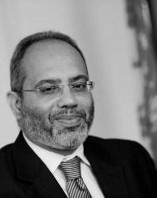
Dr. Carlos Lopes was appointed by Secretary-General Ban Ki-moon as the eighth Executive Secretary of the Economic Commission for Africa, at the level of UN Under Secretary-General, in September 2012. Dr. Lopes previously served as Executive Director of the United Nations Institute for Training and Research (UNITAR) in Geneva and Director of the UN System Staff College in Turin at the level of Assistant Secretary-General from March 2007 to August 2012.
Dr. Lopes was appointed UN Assistant-Secretary-General and Director for Political Affairs in the Executive Office of the Secretary-General during the period 2005 to 2007.
Dr. Lopes has actively contributed to research on development issues. Specialized in development and strategic planning, he has authored or edited 22 books and taught at Universities and academic institutions in Lisbon, Coimbra, Zurich, Uppsala, Mexico, São Paulo and Rio de Janeiro. He is affiliated with a number of academic networks, and has helped establish various non-governmental organizations and centers for social research, in particular in Africa. Dr. Lopes currently serves as Member of Governing Boards or advisory and editorial committees of about a dozen institutions including Kofi Annan Foundation, UNESCO International Institute for Educational Planning, Bonn International Center for Conversion, ISCTE Lisbon University Institute, Instituto Ethos, Geneva Graduate Institute of International and Development Studies,and journals such as Géopolitique Africaine, African Sociological Review, and African Identities.
Following his service in the public sector of his native Guinea-Bissau in areas of research, diplomacy and planning, Dr. Lopes joined the United Nations Development Programme (UNDP), as a development economist in 1988. While at UNDP, he occupied various positions, including Deputy Director at the Office of Evaluation and Strategic Planning, Resident Representative in Zimbabwe, as well as Deputy, and later Director of the New York-based Bureau for Development Policy. Dr. Lopes was a member of UNDP’s executive team, in recognition of the role he played in developing UNDP’s decentralized policy advisory services and knowledge networking systems. He also managed UNDP’s global programme, with a portfolio of $1 billion. In June 2003, he became the United Nations Resident Coordinator and UNDP Resident Representative in Brazil, the largest UNDP programme in the world at that time.
Carlos Lopes holds a PhD in history from the University of Paris 1 Panthéon-Sorbonne and a research master from the Geneva Graduate Institute of International and Development Studies. He has also received an Honorary PhD in Social Sciences from the University of Cândido Mendes, Rio de Janeiro, Brazil.
Mr. Abdoulie Janneh (Gambia)
(2005 - 2012)
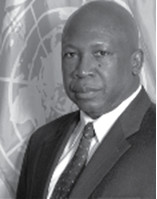
Mr. Abdoulie Janneh is from the Gambia. He was the Under- Secretary-General and Executive Secretary of the United Nations Economic Commission for Africa (ECA) from 2005 to 2012.
Before joining ECA, Mr. Janneh served as Assistant Secretary-General and UNDP Regional Director for Africa from June 2000 to October 2005. In that capacity, he managed the United Nations Development Programme's (UNDP) largest Regional Bureau, covering 45 countries in sub-Saharan Africa with a complement of over 1,500 staff. Prior to that, he held a number of senior positions in UNDP and its affiliated funds, including Resident Coordinator and Resident Representative in Ghana (1996-1999) and Niger (1993-1996), as well as Deputy Executive Secretary of the United Nations Capital Development Fund (1990-1993).
When he took over ECA in 2005, the African institutional landscape was being re-shaped and the new millennium was in its infancy. Mr. Janneh, therefore, put emphasis on re-aligning the programmes and services with the priorities of the African Union and its NEPAD programme so that ECA would be better positioned to address Africa’s development challenges, its special needs and regional integration goals, using a better collaboration between ECA, AfDB and AUC.
After ECA, Mr. Janneh joined the Board of the Mo Ibrahim Foundation, where he currently serves as the Executive Director, Liaison with Governments and Institutions in Africa for the Foundation.
He holds an MA in Urban and Regional Planning Studies from the University of Nottingham in England. He also graduated from Fourah Bay College, Sierra Leone (Engineering Science) and undertook post-graduate studies in Project Planning and Appraisal at the University of Bradford in England.
Mr. Kingsley Amoako (Ghana)
(1995 - 2005)
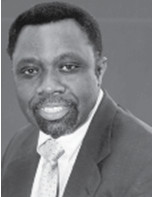
Mr. Kingsley Y. Amoako is a national of Ghana. He was the Under- Secretary-General and Executive Secretary of the United Nations Economic Commission for Africa (ECA) from 1995 to 2005.
Dr. Amoako began his career in 1974 at the World Bank, becoming the Bank’s Director for Education and Social Policy from 1992 to 1995 before joining ECA.
In his service as ECA’s Executive Secretary from 1995-2005, K.Y. Amoako’s vision was for the Commission to better respond to African policy-makers and to amplify Africa’s voice internationally. Under his mandate ECA concentrated on assisting African countries to leapfrog into the information age. He institutionalized the African Development Forum and the Big Table as platforms for African policy makers and their development partners to build consensus on key African development issues, providing the Commission with the opportunity to exert its convening power at the highest level.
Among many other assignments, Mr. Amoako chaired the Commission for HIV/AIDS and Governance in Africa, convened by Kofi Annan. He also served as a member of the Commission for Africa, established by Tony Blair. In addition, he was a member of the Commission on Macroeconomics and Health, chaired by Jeff Sachs, and of the Task Force on Global Public Goods, co-chaired by Ernesto Zedillo. More recently he was a member of the high-level panel on trade chaired by Professor Jagdish Bhagwati.
After ECA, he spent most of 2006 as a Distinguished African Scholar at the Woodrow Wilson International Center for Scholars in Washington, DC. In 2008, he founded the African Center for Economic Transformation, an economic policy institute with headquarters in Accra and working across Africa with the mission of supporting the sustained growth and transformation of African economies.
Mr. K.Y. Amoako holds an undergraduate degree from the University of Ghana, and a PhD in Economics from University of California, Berkeley.
Mr. Layashi Yaker (Algeria)
(1992 - 1995)
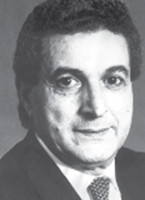
Mr. Layashi Yaker is from Algeria. He was the Under- Secretary-General and Executive Secretary of the United Nations Economic Commission for Africa (ECA) from 1992 to 1995.
Mr. Yaker is an economist, and a career diplomat. Prior to joining the United Nations, he had a rich diplomatic career in service to his native country, Algeria. From 1969 to 1977 he joined the Government of the Republic of Algeria, at that time as the Trade Minister. He then represented his country as Ambassador of Algeria for the Soviet Union for three (3) years from 1979 to 1982 and in the USA in 1983.
After that, he joined the UN as Special Advisor to the Director General of UNESCO from 1983 to 1992, before leading the ECA.
Under his mandate, he led the Commission to the Rio Summit in 1992, and he also led the effort to carry out ECA’s Rio Declaration follow-up activity: building African countries’ capacity for sustainable development by devising strategies for Agenda 21 implementation. Mr. Yaker adopted a Plan of Action to harmonize the objectives of IDDA II with those of UNTACDA II in order to facilitate implementation of both initiatives.
Mr.Issa Diallo (Guinea)
(1991 - 1992)
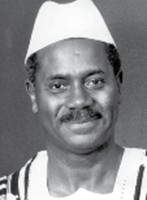
Mr. Issa Ben Yacine Diallo is a national of Guinea-Conakry. He was the Under- Secretary-General and Executive Secretary of the United Nations Economic Commission for Africa (ECA) from 1991 to 1992.
Mr. Issa Diallo is a political economist and a career diplomat. Before joining the ECA, Mr. Diallo was the Special Assistant to the Secretary-General, Perez de Cuellar, since 1986. He had joined the Executive Office of the Secretary General in 1982, as Principal Officer, and served as Director in the same office from 1985 to 1986.
Prior to that, Mr Issa Ben Yacine Diallo was Assistant Director of Training at the United Nations Institute for Training and Research (UNITAR). From 1963 to 1968, he was Deputy-General in the Economic and Technical Cooperation Division in the Ministry of Foreign Affairs of Guinea.
In 1991, he was appointed ECA Executive Secretary for a transition period of one year, during which he launched UNTACDA II as envisaged in the Abuja Treaty establishing the African Economic Community.
Mr. Diallo graduated from the University of Paris where he received a diploma in international relations and political science in 1962. He received his doctorate from the Graduate Institute of International Studies of the University of Geneva in 1973. His areas of specialization included international and regional economic and political cooperation.
Mr. Adebayo Adedeji (Nigeria)
(1975 - 1991)
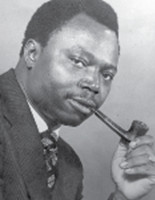
Professor Adebayo Adedeji is from Nigeria. He was the Under- Secretary-General and Executive Secretary of the United Nations Economic Commission for Africa (ECA) from 1975 to 1991. As
an African leader and an unrepentant believer in African integration and development who has had a singularly distinguished academic, political and diplomatic career in service to Africa.
Mr. Adebayo Adedeji joined the Government of the Federal Republic of Nigeria in the early 1970’s as the Cabinet Minister responsible for the economic development and reconstruction of post-civil war. During this decade, his proactive role in the establishment of the ECOWAS was strongly welcomed by his peers, who still refer to him as “le Père de la CEDEAO” (the Father of ECOWAS).
In June 1975, Professor Adedeji joined the ECA and was promoted to the rank of United Nations Under-Secretary- General in 1978. He held this position until July 1991 when he resigned his appointment to return to this native country, Nigeria, after 16 years of international service.
Under his leadership, the ECA tackled the challenges of a new international economic order to Africa and adopted landmark policies such as the Lagos Plan of Action. Prof Adedeji worked to correct the adverse impacts of SAPs on African economies, offering an alternative - AAF-SAP. He led the establishment of the RECs, beginning with ECOWAS in 1975; drew up the African Charter for Popular Participation, and pushed for the proclamation of UNCTADA I by the UN General Assembly.
Immediately after his resignation from the United Nations, Professor Adedeji established the African Centre for Development and Strategic Studies (ACDESS). Born out of the need to fill the void in strategic thinking in Africa, ACDESS «raison d’être» is to provide and promote options for overcoming the multi-layered marginalization of the vast majority of African peoples – be it within local communities, within nation-states or within the global economic and political system. Professor Adedeji created in ACDESS, a viable and sustainable centre for future studies, and he continued to dedicate himself to the struggle for an Africa which is an integral part and a fully respected partner of the world community.
In the mid 2000’s, before retiring, his last major contributions for Africa were reflected through his role as founding member of the 2005 Africa Forum of Former Heads of State and Heads of International Organizations and through his role as Chairperson of the African Peer Review Mechanism’s Panel of Eminent Persons (APRM).
Adebayo was born in 1930 and raised in Nigeria. He graduated from both London (B.Sc and Ph.D in Economics) and Harvard Universities (M.P.A.).
Mr. Robert K.A Gardiner (Ghana)
(1961 - 1975)
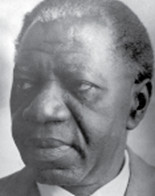
Mr. Robert Gardiner is a national of Ghana. He was the Under- Secretary-General and Executive Secretary of the United Nations Economic Commission for Africa (ECA) from 1961 to 1975.
Mr. Robert Gardiner began his career at the Fourah Bay College in Freetown, Sierra Leone, where he taught economics from 1943 to 1946. After lecturing, he joined the United-Nations Secretariat in 1946 and served for two and a half years as area specialist on research and analysis of information from trust territories, at the UN Trusteeship Department in New-York.
For the next three decades, Mr. Gardiner occupied different high level positions both in the academic and diplomatic sphere. First, at his return from New York, from 1949 to 1953 he became the Director of Extramural Studies at University College in Ibadan, Nigeria. Then, for the next six years he was in the administrative service of the former Gold Coast and, following that territory’s independence, continued with the Government of Ghana. For part of that time, he served as Director of the Department of Social Welfare and Community Development (1953-1955), permanent Secretary of the Ministry of Housing (1955-1957) and as the first Head of the Ghana Civil Service just after the country gained its independence (1957-1959).
During the year 1961, Mr. Gardiner was appointed a member of the Secretariat mission sent by United Nations Secretary General Dag Hammarskjold to the Congo, before becoming Director of the Division of Public Administration in the United Nations Department of Economic and Social Affairs.
In 1962, when he took office as Executive Secretary of the ECA, the Commission was still in the process of establishing itself as a relevant centre for development expertise in Africa. Under his leadership, from 1962 to 1975, ECA set up an institutional framework for successful implementation of African development policies and helped to establish the African Development Bank and the African Institute for Economic Development and Planning. Under Mr. Gardiner, ECA promoted post-independence original thinking and research on African policy.
Mr. Gardiner graduated from Cambridge University and did post-graduate work at Oxford and London Universities.
Mr. Mekki Abbas (Sudan)
(1959 - 1961)
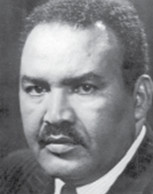
Mr. Mekki Abbas was born in Sudan. He was the first Under- Secretary-General and Executive Secretary of the United Nations Economic Commission for Africa (ECA) from 1959 to 1961.
Prior to that, he was Managing Director of the Gezira Scheme, a million-acre development project operated on behalf of the government of the Sudan, from 1955 to 1958. In earlier years he had been active in his country’s constitutional development and in the educational field.
After graduation from Gordon Memorial College, Khartoum, on January 1931, Mr. Mekki Abbas joined the Sudan Ministry of Education and served for 14 years. Then, in December 1946, Mr. Abbas left the Ministry of Education and edited a social and political weekly called ell Raid.
In 1943, he was given a grant by Rhodes Trustees and went to Oxford to do postgraduate research, following which he received the Degree of Bachelor of Letters. His thesis on «The Anglo-Egyptian Dispute over the Sudan and its effects on the Constitutional and Political Developments in that Country», was later published under the title of «The Sudan Question».
Prior to joining the ECA, Mr Mekki Abbas was appointed to the Board of Directors of the Sudan Gezira in 1950 and was responsible for the social development aspect. In April 1955 he was appointed Managing Director and held that post until United Nations Secretary-General Dag Hammarskjold appointed him as Executive Secretary of ECA, on 5 August 1958.
Under his leadership, ECA promoted statistics for African development and initiated the idea of establishing Sub Regional Offices (SROs) for enhanced service delivery in all sub regions. His service at ECA was cut short by his appointment as the Secretary General’s Representative to the Congo.